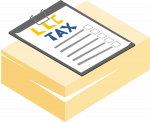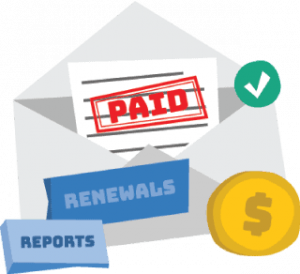West Virginia LLC Taxes
West Virginia LLCs are taxed as pass-through entities by default. This means that the LLC itself does not pay federal taxes. Instead, the LLC’s revenue is “passed through” to its members (owners). They will report this revenue as income on their personal tax return and are responsible for paying the 15.3% federal self-employment tax rate, as well as paying a personal income tax rate between 3% and 6.5% at the state level. Your LLC may also need to pay taxes to your local municipality, too.
In this article, we'll cover:


How Are West Virginia LLCs Taxed?
Not every West Virginia LLC is taxed the same. A single-member LLC (SMLLC) is taxed as a sole proprietorship by default, and multi-member LLCs are taxed as a partnership by default. LLCs who maintain their default taxes will need the following tax forms:
- Single-member LLC—Form 1040 (usually Schedule C, but some SMLLCsfile C-EZ, E, or F)
- Multi-member LLC—Form 1065
However, a West Virginia LLC can also choose to be taxed as an S-corp or C-corp. We’ll explain what this might mean for your business below.
West Virginia LLCs taxed as S-corp
You have the option to elect S-corp status for your company. Choosing S-corp status for your company means your LLC will still be taxed as a pass-through entity, but unlike LLCs that keep their default tax status, your LLC can make distributions to its members without having to pay self-employment tax. You can elect S-corp status for your LLC by filing Form 2553 with the IRS.
Just because you’ve chosen S-corp status doesn’t necessarily mean your LLC will save money, and electing this tax status can make filing taxes more complicated. We highly recommend making sure your LLC meets the IRS requirements for S-corps before applying, as well as consulting with a CPA to see if electing S-corp status is the right move for your LLC.
S-corps report their income to the IRS by filing Form 1120-S.
West Virginia LLCs taxed as C-corp
You can also elect for your LLC to be taxed a C-corp, which is the default tax status for corporations. Electing C-corp status is less common than electing S-corp status, but some LLCs can benefit from being taxed as a C-corp. C-corps have to pay the 21% federal corporate income tax and the West Virginia corporate income tax, but they’re also eligible for greater tax deductions than LLCs with default tax status and tend to be more attractive to investors. Again, we recommend consulting a CPA before you decide to elect C-corp tax status for your LLC.
C-corps file Form 1120 with the IRS.

West Virginia State Income Tax
West Virginia’s personal income tax rate varies depending on how much income you report. The tax rate ranges from 3% to 6.5%. Here’s how it breaks down:
| Taxable Income | West Virginia Personal Income Tax Rate |
| Up to $9,999 | 3% of taxable income |
| Between $10,000 and $24,999 | $300 plus 4% of excess over $10,000 |
| Between $25,000 and $39,999 | $900 plus 4.5% of excess of $25,000 |
| Between $40,000 and $59,999 | $1,575 plus 6% of excess over $40,000 |
| Over $59,999 | $2,775 plus 6.5% of excess over $60,000 |
If you’ve elected S-corp status for your LLC, your company will not need to pay the West Virginia corporate income tax. And, any S-corp operating in West Virginia that is exempt from federal income tax is also exempt from paying West Virginia income tax.
If your LLC is taxed as a C-corp, you will need to pay the West Virginia corporate income tax. As of 2022, West Virginia has a flat corporate income tax rate of 6.5%.

Sales and Use Tax
West Virginia has a sales tax rate of 6%, but cities and municipalities are allowed to impose an additional 1%. Some cities, like Charleston and Huntington, charge a total sales tax of 7%, while other towns like Cheat Lake and Pea Ridge have no additional sales tax and only charge the state’s 6% rate. You can find a more details list on the West Virginia Tax Division’s website.

Local West Virginia Taxes
It’s important that you follow local tax laws in the city or county where your LLC is located and anywhere else you do business. Some municipalities charge other, local taxes on certain goods and services, like alcohol, cannabis, soft drinks, and tobacco.

Other Taxes in West Virginia
Here are some other taxes that are imposed by the state of West Virginia.
West Virginia State Employer Taxes
If you are employer, you will need to pay unemployment insurance (also called unemployment compensation tax) and workers’ compensation taxes:
- Unemployment Compensation (UC) Tax— Most new employers will begin with a rate of 2.7% that remains the same for 36 months. After that, the cost will adjust depending on your business’s industry.
- Workers’ Compensation—All West Virginia employers are required to purchase and maintain workers’ compensation insurance coverage. Workers’ comp rates range from as low as $0.09 per $100 for clerical office employees to $11.75 per $100 for roofing contractors. The West Virginia Insurance Commissioner regulates the rates that insurance companies are able to charge. Check out their website for more information on workers’ compensation insurance in West Virginia.
To learn more about West Virginia employer taxes, visit the West Virginia Division of Labor (DOL) website.
Industry Taxes
The West Virginia Tax Division also imposes taxes on certain industries. Here’s a list of industry-specific taxes in West Virginia:
- Beer and Wine Tax
- Health Care Tax
- Cannabis Dispensary Tax (CDT)
- Soft Drink Tax
- Solid Waste Assessment Fee
- Tobacco Tax
- E-cigarette Liquids Tax
Find more information on industry taxes on the the West Virginia Tax Division website.

Do foreign LLCs in West Virginia need to pay taxes?
Yes they do. If you have a West Virginia foreign LLC (an LLC that operates in West Virginia, but wasn’t formed there) you will still need to pay state income tax and any local taxes where your business is operating. It’s important to check in with your local government agencies to understand what other sales and use taxes and/or local taxes you may need to pay.





